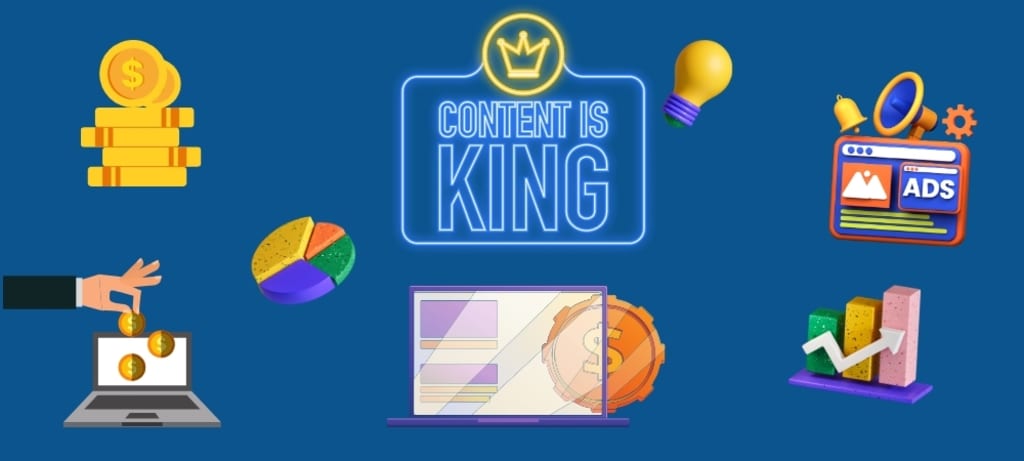The Ultimate Guide To Making Money With Internet Marketing
Let's turn your financial struggles into success!

Internet use is still increasing worldwide every day — in fact, over 4.95 billion people around the world use the internet.
Table of Contents:
1. Introduction
● Overview of Internet Marketing
2. Core Components of Internet Marketing
● Search Engine Optimization (SEO)
● Content Marketing
● Social Media Marketing
● Email Marketing
● Pay-Per-Click (PPC) Advertising
● Affiliate Marketing
3. How Internet Marketing Works
● Identifying the Target Audience
● Creating and Implementing Strategies
● Utilising Analytics and Data
4. Conclusion
● Summary of Key Points
● Importance of Internet Marketing for Business Growth
5. Frequently Asked Questions (FAQs)
Understanding Internet Marketing and How It Works:
Internet marketing, also known as online marketing or digital marketing, involves promoting products or services over the internet. It encompasses a wide range of strategies and techniques designed to reach a targeted audience, drive traffic, and generate sales. Internet marketing leverages various online channels and tools, making it an essential component of modern business strategies.
Core Components of Internet Marketing:
1. Search Engine Optimization (SEO): SEO is the practice of optimising a website to rank higher in search engine results pages (SERPs). It involves keyword research, on-page optimization, content creation, and building backlinks. The goal is to increase organic (non-paid) traffic to the website.
2. Content Marketing: This strategy focuses on creating valuable, relevant content to attract and engage a target audience. Content can take many forms, including blog posts, articles, videos, infographics, and podcasts. Effective content marketing builds trust and authority, driving organic traffic and conversions.
3. Social Media Marketing: Utilising social media platforms like Facebook, Instagram, Twitter, and LinkedIn to promote products or services, engage with customers, and build brand awareness. Social media marketing can involve both organic posts and paid advertising.
4. Email Marketing: Sending targeted email campaigns to a list of subscribers to nurture leads, promote products, and buildcustomer loyalty. Email marketing is highly effective for direct communication and personalised offers.
5. Pay-Per-Click (PPC) Advertising: Running paid ads on search engines and social media platforms. Advertisers pay a fee each time their ad is clicked. PPC campaigns can quickly drive targeted traffic to a website and are often used for lead generation and sales.
6. Affiliate Marketing: Partnering with affiliates who promote your products or services in exchange for a commission on sales. This performance-based marketing strategy expands reach and leverages the affiliates' audiences.How Internet Marketing Works:
Internet marketing works by leveraging the vast reach of the internet to connect with potential customers where they spend their time online. It starts with identifying the target audience and understanding their needs and behaviours. Businesses then create and implement strategies to attract, engage, and convert this audience.
Analytics and data play a crucial role in internet marketing. Marketers track and measure the performance of their campaigns using tools like Google Analytics, social media insights, and email marketing software. This data-driven approach allows for continuous optimization and improvement of marketing efforts.
Conclusion:
Internet marketing is a multifaceted discipline that utilizes various online channels to promote products and services, reach a broader audience, and drive sales. By understanding and implementing effective internet marketing strategies, businesses can achieve significant growth and success in the digital landscape.
Frequently Asked Questions (FAQs)
What are the five Ps of internet marketing?
● The five Ps of internet marketing include product, price, place,promotion and people. These each represent a critical aspect of marketing strategy.
How do I become a digital marketer with no experience?
● Begin by learning the fundamentals of digital marketing. There are numerous online resources and tutorials available that cover various aspects of digital marketing. Apply what you’ve learned by working on personal projects, then compile your projects and achievements into a digital marketing portfolio. Finally, look for internships, volunteer work or freelance opportunities to gain hands-on experience.
Is digital marketing a good side hustle?
● Yes, digital marketing can be a good side hustle because it doesn’t typically require you to work set hours—you can create content or analyse ROI any time of day. There’s also minimal investment, as you can utilise free tools and online resources. Businesses of all sizes require help with their online marketing efforts, presenting ample opportunities for side hustlers.
Try this amazing training that made me $500 with Internet Marketing
About the Creator
Enjoyed the story? Support the Creator.
Subscribe for free to receive all their stories in your feed.





Comments
There are no comments for this story
Be the first to respond and start the conversation.